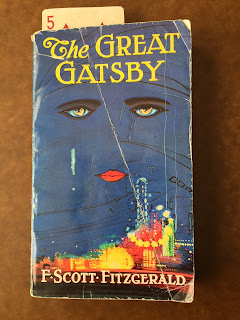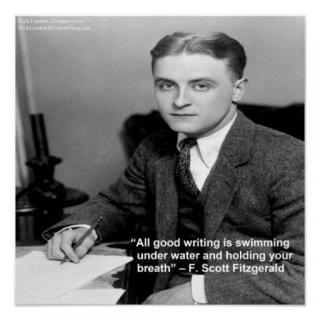THE IMPOSTER SYNDROME
and the greatest American Novelist of all time
This is probably what my copy looked like of what was required reading in High School English classes of the mid 1970s. I probably yawned and labored through the assignment as we all did in those years. But something happened in 1974 - a book required as reading took on a whole new dimension: It was made into a movie. Alright, it wasn't the best movie. But it was a movie adaptation starring Robert Redford and Mia Farrow. About all the good I can say for it was it also starred Lois Chiles as Jordon Baker. Otherwise it was a a typical studio release film of the era and quite lame at that.
Sadly, it was not until my late twenties into my thirties as a returning student to the University of Texas at El Paso that I took another look at the #1 novel of all time. I slowly turned the pages for enjoyment and study instead of laborious required reading and the novel began to speak to me in ways I cannot explain. After living a decade of life as an adult in the similar West Egg and among differing social classes of people in the Texas oil rich Permian Basin I found I had a lot in common with Gatsby, the poorer James Gatz and though a big fish in the smaller media radio and television ponds of Odessa and Midland I learned one too many times that 'rich girls don't marry poor boys.' I had a patron saint in my thirties and it was F. Scott Fitzgerald.
It would take another decade to reach the 2000s and both the struggles of a small production studio ownership company into bankruptcy in 2007 and then several more professional set backs to set me on the path to possibly becoming a published author myself. A goal I'm nearing or so I hope.
I purchased a newer edition of the novel and did a double take when its 148 pages surprised me with the brevity of the brilliance. I picked up biographies and commentaries on the masterpiece as I studied it cover to cover among picture books and other titles on the life of Fitzgerald and his decades of struggling as a writer. The irony for Fitzgerald was the same for Vincent van Goght that a breakthrough masterpiece artist seldom gets the opportunity in his or her lifetime to realize what their craft will become when it goes viral beyond their lifetime.
F. Scott died in 1940 thinking his writing was a failure and he was a hack. He even wrote a series for Esquire Magazine with 17 monthly installments of through the character of the Pat Hobby Stories mocking his experiences. When I learned what became the greatest novel of all time sold less than 20,000 copies in its first 1925 run I found I experienced the same syndrome (yes its labeled a syndrome) as Fitzgerald thinking I was a hack and would never make it as a writer in the industry.
My struggle has apparently been common for many writers. I have been writing paperback Christian Fiction novels targeted to major publisher Harlequin Love Inspired books under the Harper Collins umbrella of companies since 2012. Not until this past week do I have a name for the challenges I've been facing. I have writer colleague Laurie Alice Eakes to thank for her attending the Romance Writers of America 2016 conference and hearing about the author who wrote about The Imposter Syndrome, by Valerie Yong. This finally identifies what I've been dealing with and even with psychological therapy have not fully overcome.
Sometimes we have great teachers who are natural encouraging mentors but in my lifetime my English Grammar tests and pages bled red ink and so did my compositions for spelling and grammar usage. Not until the computer age with spell check and the ability to type and print did I become a college graduate at age 34 with a 3.31 GPA overall and both a 3.57 and 3.58 in my Major and Minor. Even with poor GRE scores on a Masters Program I still earned a 3.71 GP over all. Testing is not everything its cracked up to be.
Somewhere in my lifetime the concept of You have to be PERFECT was planted and imperfection was criticism without a plan for learning and failing courses or subjects became the punishment for a slow learner. I still went on in life to have over 30 years in broadcast media both on air as a personality and behind the scenes in production and station management. But because that did not extend beyond 30 years into the 2000s of media downsizing, technology replacing manpower and economic recessions or depressions the old programming replayed as I considered publishing as a second half of life career.
From Amazon:
While the impostor syndrome is not unique to women, women are more apt to
From Amazon:
While the impostor syndrome is not unique to women, women are more apt to
agonize over tiny mistakes, see even constructive criticism as
evidence of their
shortcomings, and chalk up their accomplishments to
luck rather than skill. They
often unconsciously overcompensate with
crippling perfectionism, overpreparation,
maintaining a lower profile,
withholding their talents and opinions, or never finishing
important
projects.
When they do succeed, they think, Phew, I fooled ’em again.
When they do succeed, they think, Phew, I fooled ’em again.
Young gives these women the solution they have been seeking. Combining insightful
analysis with effective advice and anecdotes, she explains
what the impostor
syndrome is, why fraud fears are more common in women,
and how you can
recognize the way it manifests in your life. With her
empowering, step-by-step plan,
you will learn to take ownership of your
success, overcome self-doubt, and banish the
thought patterns that
undermine your ability to feel—and act—as bright and capable
as others
already know you are.
While I will have to discount her bias in gender specific identification I will take what men are learning in these seminars to apply to my work as a writer and hopefully get past the writers block my work is somehow not prime time ready when in fact after five years of study I have learned and can apply the principles to my work.
I lament that Fitzgerald never in this lifetime realized his brilliance. When I get down or into a writers block mentality I take James Scott Bell's counsel in writing to inspire my heart with soundtrack theme music that goes the distance. Sometimes that includes recordings from The Walton's, Field of Dreams, Chaplin, and this brilliant 2013 version of The Great Gatsby. I find myself in the character of Nick Caraway within counseling and working past the blocks that suggest I'm less than the best or will ever find validation in publishing. The truth though goes deeper - to find the validation from myself I have great stories to tell and ones people will want to read.
Is there a Gatsby in my work? I'll never know until I edit one of my drafts and provide three chapters and a synopsis to an Editor who wants to see the material from me. I am at the Altar or Threshold to find out but have been stuck in doubt I can juggle all the rules and have something worth with potential instead of the fear of bleeding returned pages and the note to pick another occupation to pursue.
I'll go out on one more limb: I believe singles who are writers or who are marrieds in bad relationships (who are not positively reinforced) struggle with this more than those in healthy and encouraging relationships. Those also who have been through trauma or challenges in life. Robert Harling in Steel Magnolias used the southern saying "The things that don't kill us only make us stronger," while Steven Rogers screen writer of Hope Floats summarizes it at the end of the story:
"Childhood is what you spend the rest of your life trying to overcome.
That's what Mama used to say.
She said, "Beginnings are scary,
endings are usually sad...
...but it's the middle
that counts the most."
You need to remember that when you find yourself at the beginning.
Just give hope a chance to float up.
And it will too."
F. Scott Fitzgerald thought in 1939 to 1940 when he died that he was a hack and had no talent at all. From Wikipedia:
"Into the 21st century, millions of copies of The Great Gatsby and his other works have been sold, and Gatsby, a constant best-seller, is required reading in many high school and college classes." https://en.wikipedia.org/wiki/F._Scott_Fitzgerald Tomorrow is another chance to to try again. So I will be reading Valerie Young's book of steps to correct the thinking and moving into James Scott Bell's Revision and Self-Editing for Publication as I edit the first three chapters of OUR PLACE: HER RESCUE OFFICER and revisions on the Synopsis.
Stephen -
While I will have to discount her bias in gender specific identification I will take what men are learning in these seminars to apply to my work as a writer and hopefully get past the writers block my work is somehow not prime time ready when in fact after five years of study I have learned and can apply the principles to my work.
I lament that Fitzgerald never in this lifetime realized his brilliance. When I get down or into a writers block mentality I take James Scott Bell's counsel in writing to inspire my heart with soundtrack theme music that goes the distance. Sometimes that includes recordings from The Walton's, Field of Dreams, Chaplin, and this brilliant 2013 version of The Great Gatsby. I find myself in the character of Nick Caraway within counseling and working past the blocks that suggest I'm less than the best or will ever find validation in publishing. The truth though goes deeper - to find the validation from myself I have great stories to tell and ones people will want to read.
Is there a Gatsby in my work? I'll never know until I edit one of my drafts and provide three chapters and a synopsis to an Editor who wants to see the material from me. I am at the Altar or Threshold to find out but have been stuck in doubt I can juggle all the rules and have something worth with potential instead of the fear of bleeding returned pages and the note to pick another occupation to pursue.
"Childhood is what you spend the rest of your life trying to overcome.
That's what Mama used to say.
She said, "Beginnings are scary,
endings are usually sad...
...but it's the middle
that counts the most."
You need to remember that when you find yourself at the beginning.
Just give hope a chance to float up.
And it will too."
F. Scott Fitzgerald thought in 1939 to 1940 when he died that he was a hack and had no talent at all. From Wikipedia:
"Into the 21st century, millions of copies of The Great Gatsby and his other works have been sold, and Gatsby, a constant best-seller, is required reading in many high school and college classes." https://en.wikipedia.org/wiki/F._Scott_Fitzgerald Tomorrow is another chance to to try again. So I will be reading Valerie Young's book of steps to correct the thinking and moving into James Scott Bell's Revision and Self-Editing for Publication as I edit the first three chapters of OUR PLACE: HER RESCUE OFFICER and revisions on the Synopsis.
Stephen -





